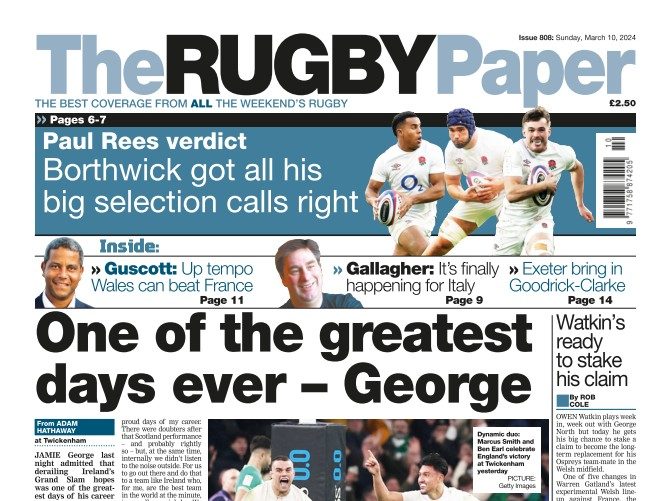THE decision by the RFU to launch a review of the historical context of Swing Low, Sweet Chariot shows how inept the current administration is.
The RFU should already know the context inside-out, which is that it was written by Wallis Willis, a freed slave, and that is a song about freedom, which uses the language of Christian imagery.
One of the most famous performances of it was by the folksinger Joan Baez, who was a noted Civil Rights activist, at the Woodstock Festival in 1969.
It was adopted by large sections of Twickenham crowds to salute the try-scoring feats of two exceptional black wingers, Martin Offiah, and Chris Oti. In Offiah's case it was at the 1987 Middlesex Sevens, while the rendition for Oti appeared to those of us in the Press box to be a spontaneous rendition to celebrate the hat-trick of tries the Wasps winger scored in the 1988 Five Nations victory over Ireland, in only his second Test.
Attempting to ban Swing Low, Sweet Chariotwould be a big mistake on a couple of counts.
First, because its adoption is about a celebration of black players.
Second, without the sort of surveillance systems and paramilitary snatch squads employed in China and Russia it would be virtually impossible to police if large sections of the Twickenham crowd – or any other – decided to sing it in defiance of any gagging order.
The only means of banning the song from Twickenham is to gain the consent of the rugby public.
However, I have my doubts that it would be forthcoming, because outside the corridors of RFU power there is a premium placed on something called common sense.THE decision by the RFU to launch a review of the historical context of Swing Low, Sweet Chariot shows how inept the current administration is.
The RFU should already know the context inside-out, which is that it was written by Wallis Willis, a freed slave, and that is a song about freedom, which uses the language of Christian imagery.
One of the most famous performances of it was by the folksinger Joan Baez, who was a noted Civil Rights activist, at the Woodstock Festival in 1969.
It was adopted by large sections of Twickenham crowds to salute the try-scoring feats of two exceptional black wingers, Martin Offiah, and Chris Oti. In Offiah's case it was at the 1987 Middlesex Sevens, while the rendition for Oti appeared to those of us in the Press box to be a spontaneous rendition to celebrate the hat-trick of tries the Wasps winger scored in the 1988 Five Nations victory over Ireland, in only his second Test.
Attempting to ban Swing Low, Sweet Chariotwould be a big mistake on a couple of counts.
First, because its adoption is about a celebration of black players.
Second, without the sort of surveillance systems and paramilitary snatch squads employed in China and Russia it would be virtually impossible to police if large sections of the Twickenham crowd – or any other – decided to sing it in defiance of any gagging order.
The only means of banning the song from Twickenham is to gain the consent of the rugby public.
However, I have my doubts that it would be forthcoming, because outside the corridors of RFU power there is a premium placed on something called common sense.



























